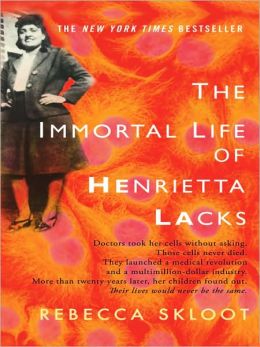'Immortal Life of Henrietta Lacks' Named SU New Student Reader Book
 SALISBURY, MD---Henrietta Lacks has saved — and created — millions of lives during the past six decades. Yet, she was not a doctor or even a scientist; she was a poor African-American tobacco farmer from Virginia.
SALISBURY, MD---Henrietta Lacks has saved — and created — millions of lives during the past six decades. Yet, she was not a doctor or even a scientist; she was a poor African-American tobacco farmer from Virginia.
In 1951, nearly a decade after moving with her husband to the Baltimore area, Lacks was diagnosed with cervical cancer at Johns Hopkins Hospital. Before she died of uremic poisoning, thought to have been caused by the disease, doctors took samples of the cancerous and non-cancerous tissue of her cervix for research without her knowledge or permission.
Using these samples, Dr. George Otto Gey developed an immortalized human cell line. Called the “HeLa” line, those cells have been one of the most important tools in medicine, vital for developing vaccines to diseases such as polio, cloning, gene mapping and in vitro fertilization. They continue to be used in cancer and AIDS studies.
Author Rebecca Skloot profiles Lacks and her medical legacy in The Immortal Life of Henrietta Lacks, this year’s New Student Reader book at 黑料网. Members of the Lacks family participate in a moderated question-and-answer session and sign copies of the book 7 p.m. Thursday, August 21, in Perdue Hall’s Bennett Family Auditorium. Those planning to attend are encouraged to read the book in advance.
A painting of Lacks by SU art student Kelcie Mack, working with Jinchul Kim of the Art Department, will be unveiled at the event, displayed during SU’s Fall Convocation and later hung in Henson Science Hall. Admission to the Q&A and portrait unveiling is free and the public is invited.
The next day, the Lacks family meets with new students at SU and attends Fall Convocation, featuring guest speaker Dr. Joseph Herman. A 1994 SU graduate, Herman is director of the pancreatic multidisciplinary clinic at the Johns Hopkins Sidney Kimmel Comprehensive Cancer Center. He also is director of clinical research in the radiation oncology department and an associate professor of radiation oncology and molecular radiation sciences.
Admission to Convocation is by invitation only.
Skloot first became interested in Lacks through a high school science class and began researching the book as a graduate student in 1999. Contacting the family, she traced not only the evolution of the HeLa line and the medical breakthroughs it led to, but the emotional journey the family has taken since first learning of the cells’ existence in 1973, as well as changes in medical ethics and law since the ’50s. The book, her first, earned rave reviews.
“Science writing is often just about ‘the facts,’” said The New York Times. “Skloot’s book … is far deeper, braver and more wonderful.”
“Immortal Life reads like a novel,” said The Washington Post. “The prose is unadorned, crisp and transparent. The book … should be treated as a work of American history.”
Celebrating its 10th year, SU’s New Student Reader Program is designed to orient new students to the academic community by sharing a common reading experience with classmates, faculty, staff and upperclassmen who serve as orientation team peer leaders.
For more information, call 410-543-6030 or visit the SU website at www.salisbury.edu.
